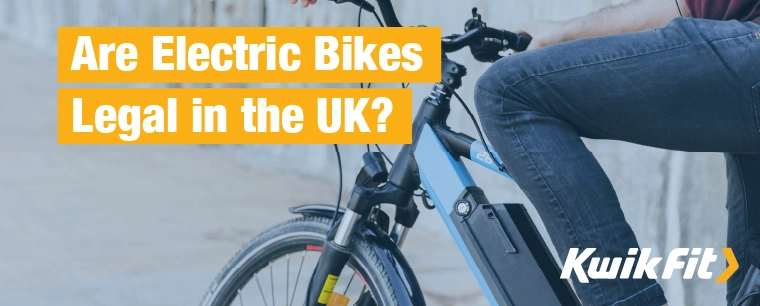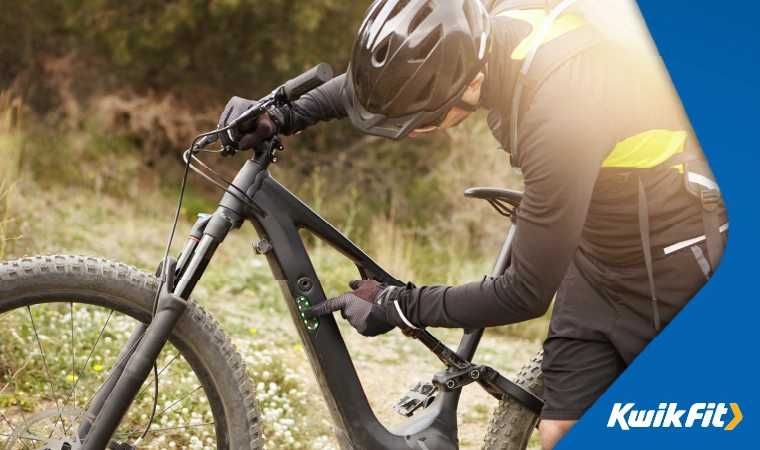Are Electric Bikes Legal in the UK?
Jack Dreyer | Friday 27th October 2023 2:00pm

With a massive explosion in the popularity of electric and hybrid vehicles over the last five years, it’s natural that there’s been a similar boom in tech for alternative transport. Electric bikes and scooters are likely one of the fastest-growing segments of alternative transport – but are electric bikes actually legal in the UK?
E-scooters have been in the news quite a bit recently and (rented ones) are legal within certain trial areas in the UK, but what about e-bikes?
E-bikes are legal
So, the short answer here is that, yes, electric bikes are legal in the UK – but this comes with some caveats.
Electric scooters are still not legal largely because they’re a new phenomenon, not because they’re necessarily inherently more dangerous. Bicycles, however, have been around forever – so e-bikes have the luxury of stepping into the shoes of a century-old tradition of cycling.
Because e-bikes are classified as “electrically assisted pedal cycles” (or EAPCs for short), they don’t need to be taxed or insured to be used on public roads. This also means that you don’t need a licence to ride one like you would with a motorbike.
That said, the DVLA has set some rules for what meets the legal definition of an EAPC.
What classes as an Electrically Assisted Pedal Cycle?
The most important distinction is that the bike has pedals that you can use to propel the bike. An all-electric motorbike, for example, counts as a motor bike because there isn’t any manual form of power you can use – only the electric motor.
And this brings us to the next most important distinction: the electric motor on an EAPC can’t have a power output of more than 250W and has to cut out above speeds of 15.5mph. This means that you can only go as fast as an experienced cyclist by cycling manually.
Another key distinction is that the cycle doesn’t have to be a two-wheel cycle. Motor-assisted trikes can also be classed as EAPCs if they meet the other criteria.

A cyclist presses buttons on their electric bike.
Anywhere where normal bicycles are allowed to be ridden. Because they’re legally classed as pedal bikes and because they’re not motor-assisted to reach high speeds, they can be used off-road, on cycle paths, and on any roads where cycles are permitted.
This, importantly, doesn’t include pavements.
Why don’t e-bikes need to be taxed & licenced?
It’d be natural as a driver, then, to start shaking a fist at the sky asking “why don’t e-bikes need road tax and why don’t the riders have to have a licence?”.
To begin with, road tax isn’t actually a tax for roads as is commonly believed. You’ll probably have heard it called by its proper name: “Vehicle Excise Duty”. Excise duties are those levied against things that negatively affect public health – things like tobacco and alcohol.
Vehicle excise duty is therefore levied against combustion-engine cars because the burning of petrol or diesel creates exhaust emissions that affect the air quality around them. Bicycles, like electric vehicles, don’t need to be taxed because they don’t have any direct emissions!
Onto the question of licensing & insurance. The requirement for drivers to be licensed is primarily intended to ensure that every driver meets a minimum aptitude level to be able to drive on public roads. Fundamentally, this is a question of safety. Everyone needs to understand and use the same rules on the road for collisions to be kept to a minimum and, ultimately, car drivers have the potential to do a lot of harm if they don’t know what they’re doing.
If two cyclists collide, they may get some scuffs, bruises, and potentially a broken bone – but other than the good amount of swearing, they’re likely to walk away from a bicycle collision largely unscathed. If a cyclist and a car collide, the cyclist will invariably be worse off.
Deciding to cycle without knowing how to cycle is therefore a personal choice; you absolutely should learn the laws of the road but failing to do so only really poses a threat to yourself. Deciding to drive a car without knowing what you’re doing is an altogether more serious matter.
Go green, go electric
Commuting to work or running errands by bike is the best way to access inner-city mobility without creating emissions. It’s also super healthy! But manually cycling is also quite exhausting – so if you’re considering switching to a manual commute, an e-bike is a great option!
And, if you need assessments, assembly, repairs, and servicing for your new e-bike, you may be able to get them at your local Kwik Fit centre! We’ve teamed up with the bike experts, Fettle, to offer bike service stations right in our centres – find the nearest one here.
Any facts, figures and prices shown in our blog articles are correct at time of publication.
Featured Articles
Is it Illegal to Drive With One Headlight?
Saturday 19th July 2025
Wondering if it’s illegal to drive with one headlight? Learn about the safety risks and penalties of illegal blown bulbs and why you should fix them promptly.
Air Con in EVs & Hybrids: Experts Answer Your Questions
Monday 30th June 2025
Does air con drain EV batteries? Can you use the air con while charging an electric car? Find out the answers to these questions & more from Kwik Fit’s experts.
Why Is Your Car Making a Noise? Fixes & Tips
Friday 13th June 2025
When your car starts making unexpected noises, it can certainly be quite disconcerting; it may be nothing to worry about, but here’s what you need to know.









